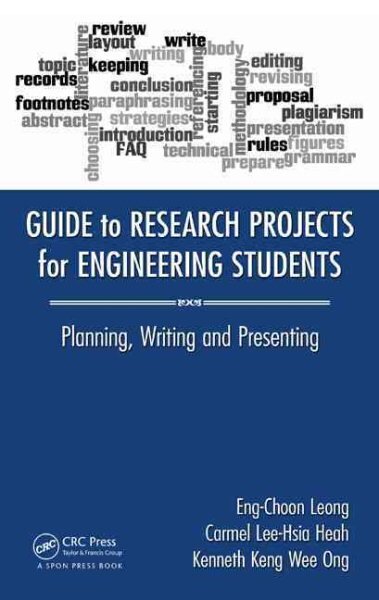This writing guide is specifically designed for engineering students embarking on a research project. With advice directed to both undergraduate and graduate students, the book can be used in courses in engineering, technical writing, and technical communication. The first part of the book is devoted to planning the research project, from researching a topic and writing a proposal, to selecting methods and keeping a research log. The second part of the book focuses on writing the different sections of a research report, such as the introduction, the literature review, and the results and discussion; this section also gives advice on referencing and avoiding plagiarism, and covers writing conventions, common grammar and punctuation issues, and style specifics of technical writing. The last section of the guide tackles issues of presenting the project, with advice on designing layout, integrating figures, and giving oral presentations. Step-by-step instructions are illustrated with screen shots on almost every page, depicting tasks in Microsoft Word and other Microsoft applications. Fact boxes give historical perspectives on writing in engineering. Annotation ©2015 Ringgold, Inc., Portland, OR (protoview.com)
Presents an Integrated Approach, Providing Clear and Practical GuidelinesAre you a student facing your first serious research project? If you are, it is likely that you’ll be, firstly, overwhelmed by the magnitude of the task, and secondly, lost as to how to go about it. What you really need is a guide to walk you through all aspects of the research project, from planning and conducting your research project to writing and presenting it.Guide to Research Projects for Engineering Students: Planning, Writing and Presenting is the guide you need to do the job efficiently.Specifically Designed with Engineering and Technical Science Students in MindThe book is organized into three sections, broken down into concise chapters that focus on a specific topic and the skills required. The section onplanning shows you how to choose a project, research a topic, write a project proposal, plan the project, select methods and methodologies, and keep records. The section onwriting provides help on writing the different sections of a research report as well as introduces you to the strategies and language conventions required for writing an effective research report. Finally, the section onpresenting covers creating effective figures and layout, preparing for a project presentation, and the dos and don’ts in delivering a presentation. Advice on how to use IT tools effectively is given throughout the book.Contains highly practical content—includes tips on how to conduct research, write it up effectively, and avoid common errors and pitfalls in grammar and styleOffers guidance on using IT tools (which are indispensable in research)Includes pertinent examples of best practices on conducting research and research writingThe authors have drawn on their many years of experience teaching engineering students, either in supervising engineering students in their research projects or teaching technical communication skills.
